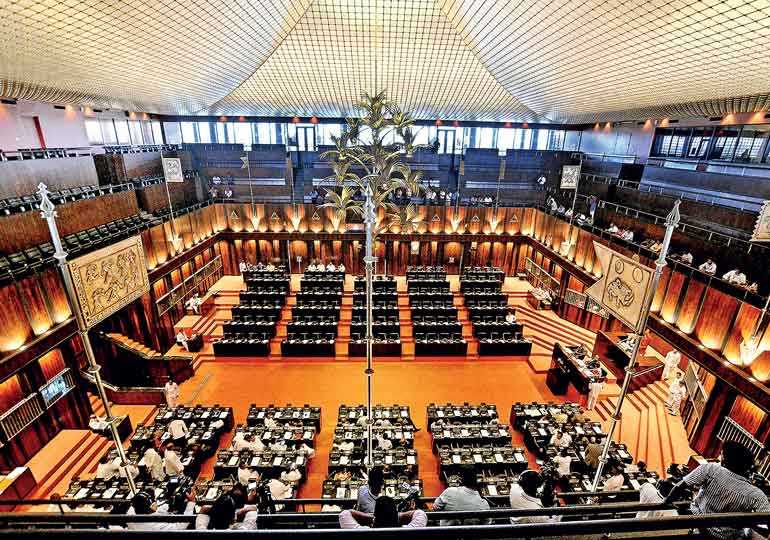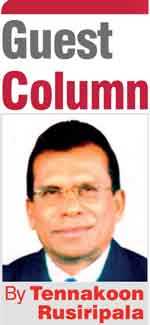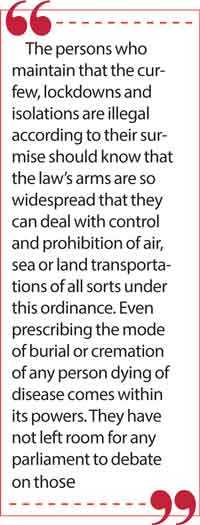Sunday Feb 15, 2026
Sunday Feb 15, 2026
Tuesday, 19 May 2020 00:25 - - {{hitsCtrl.values.hits}}

A parliament which has ended its term is of no value or use for any future policy planning. The whole world is in a dilemma trying to shift
directions and adjust their current plans and policies to cope up with a situation that has not yet ended. Other than to serve as a ploy for reconvening the parliament for some ulterior objective and for the restoration of their bundle of privileges providing them so much security and comfort, it is a completely irrational demand
The big-wigs are engaged in a legal battle on the constitutionality of many things. All their arguments appear sound, hard and plausible to the gullible. It is difficult for a layman to form a correct opinion when experts hold different views. Winning of the battle may not be enough to engage the admiration of all. General public are more concerned with the visible status than the long term consequences. But the Pooh-Bah continue unmindful about the gaze of the bystanders, upon them.
I wish to refer to the article by Janith Devapriya in the Daily FT as a rejoinder to mine. While clarifying some of the issues he has raised, I also wish to comment on certain points raised by Nihal Jayawckrama on the same subject in the DFT. 
Janith’s account about coronavirus (COVID-19) is factual and there is no dispute that it is a serious situation posing a big threat to the whole world. He has also elaborated on the economic and social consequences related to the issue. I have no disagreements whatsoever on those. But I have to point out certain things relevant. I have to state that his quote “some maintain that the country is heading towards another crisis amidst the COVID-19 pandemic” by me was to address a different aspect. My main focus was on the legal issues raised by politico- legal sources about an impending constitutional crisis which they, themselves have raised.
We have to look at both COVID-19 crisis and the so-called constitutional crisis separately.
Therefore, while endorsing Janith’s views about the impending crunch resulting from the pandemic, I wish to comment on certain references appearing to me as misconceptions. Semantics apart, I had dealt with in detail about the applicability of certain articles in the constitution, as we understand, in the context of the relevant circumstances, warranting such application. I do not wish to dwell on them again. However, I wish to delve into his arguments further on three matters, the three-month rule, emergency situation and the need for the parliament to meet.
Three-month rule
He has cited Article 70 stating that according to the following sub-sections the State cannot function without Parliament (Legislature) for more than three months. But a careful check will show that all three sub-articles deal with a different aspect. 
Article 70 (5) (a) essentially deals with the proclamation and what it should contain,
And (5) (b) deals with the same subject of what the proclamation should include in the event of the Parliament getting dissolved after its full term in office according to Article 62 (2)
(5) (c) deals with a situation of the President having to change the date already given in the proclamations under (a) and (b).
None of these provisions point to any special compulsion of law that the new Parliament under any circumstances will have to meet within three months.
Janith like many other legal personnel who have expressed views, feels that the mention of three months in Article 150 (3) further enhances or supports the stand that the parliament has to meet under any circumstances within three months after dissolution. This misconception alone is sufficient to establish the degree of fallacy of this argument. The mention of three months here is for an entirely different purpose. I trust a careful second reading by all concerned will clear the doubt. It deals with the authority the President is given to continue the issue and expenditure from the Consolidated Fund any sum he may consider necessary for the public services, even after the new parliament meets after elections for a further period of three months. How this can be construed to mean ‘the parliament has to meet within three months after dissolution’ is beyond comprehension.
Prompted by Janith’s quote from Wikipedia to elaborate the vicissitudes of the corona pandemic, I too visited it to find exactly what a proclamation means. As there is nothing under the Interpretation in Article 170 to explain what a proclamation is, presuming that we have to take the literal meaning in such a situation, I referred to other sources. The Composite Glossary of Legal terms published in 1964 gives proclamation = ‘prakashanaya’ in Sinhala. When translated direct to English it means a declaration.
Oxford English Dictionary gives its meaning as ‘a public statement’. Wikipedia explains it as follows; “A major statement made in front of an audience or the authoritative word on some subject is a proclamation. It’s usually used in an official or government context, although an ordinary person can also make a proclamation, like your proclamation that you will never dance again after your embarrassment at last week’s hip hop recital. The root is proclaim, declare publicly, though the i is dropped in the proclamation.”
Collins Dictionary definition of Proclamation is, ‘a proclamation is a public announcement about something important, often about something of national importance’.
Wikipedia goes further to explain the difference between an executive order and a proclamation.
viz. Presidential proclamation; “such orders carry the same force of law as executive orders, the difference between being that executive orders are aimed at those inside the government, but proclamations are aimed at those outside the government”.
An Executive Order is a type of a written instruction that presidents use to work their will through the executive branch of the Government. Courts can strike down executive orders that exceed the scope of the President’s authority. In this instance the Constitution has taken many things into consideration. While the President is expected to announce and declare things that he is compelled to announce, his powers and duties also require that “he shall take care that the laws be faithfully executed”
The execution of the laws relating to the elections is a power vested in the Elections Commission. Hence the proclamation gives the authority for the Commission to start the process of holding the elections subject to the applicable law. It becomes a thing completely in his realm. I also wish to reiterate the only instance the constitution refers regarding the maximum period during which a parliament cannot continue without a meeting.
Article 70 (2) “parliament shall be summoned to meet once at least in every year”. The obvious anti-thesis to this is that a duly constituted parliament can go on without any meeting for 364 days! And there is no direct rule to hold anyone responsible for either not reconvening a dissolved parliament or binding someone to be accountable to compulsorily hold the elections after a dissolution within three months, come what may.
Emergency situation
Re – his stand on the emergency situation; Janith sees it as; “in such a serious emergency situation where people’s lives are at stake (health) and the economy of the country is at a virtual standstill…et al.” should be viewed as a major emergency. He has stated that government needs all inputs to take the country on the right track and the Parliament should do it. There are two basic flaws in his position.
The lawmakers have identified one century and 23 years ago (1897) what steps should be taken as necessary and expedient for the purpose of preventing the introduction into Sri Lanka of any disease, and also preventing the spread of any disease in and outside Sri Lanka and formulated comprehensive legislation for the purpose. It will be interesting for any one ignorant of this to read and understand the scope, powers vested in designated government officials under the regulations of Quarantine and Prevention of Diseases Ordinance Chapter 553 no. 3 of 1897 and the subsequent amendments (QPDO).
The persons who maintain that the curfew, lockdowns and isolations are illegal according to their surmise should know that the law’s arms are so widespread that they can deal with control and prohibition of air, sea or land transportations of all sorts under this ordinance. Even prescribing the mode of burial or cremation of any person dying of disease comes within its powers. They have not left room for any parliament to debate on those.
Even if the parliament was in session there is hardly anything much the parliamentarians, government or opposition could go beyond. The emergency that Janith sees has been adequately covered legally. Unless someone is viewing things in bias, Sri Lankan authorities have so far done all what could have been feasible and are continuing with the good work.
Need for Parliament to meet
With regard to his justification for the Parliament to address new policies for economic revival is something similar to ‘trying to pre-empt heaven and raise hell’. A parliament which has ended its term is of no value or use for any future policy planning. The whole world is in a dilemma trying to shift directions and adjust their current plans and policies to cope up with a situation that has not yet ended. Other than to serve as a ploy for reconvening the parliament for some ulterior objective and for the restoration of their bundle of privileges providing them so much security and comfort, it is a completely irrational demand. People who are more conversant with procedures and sensible approaches tend to keep quiet while the stolid try to ride the crest. That is why I said it is a second eleven game!
The running of the country under a caretaker cabinet is not an argument built by me as Janith is attempting to show. It is laid down in the very constitution that he and others try to pick bits and pieces from to maintain their view point. The constitutional makers have foreseen such calamities and unpredictable situations and provided adequate measures to survive those. I have pointed out the powers of the Election Commission over the caretaker cabinet quoting the Article 47(1) of the 19th Amendment to elaborate.
Just a passing reference to Article 70(7) quoted by many in support of their claim to reconvene the Parliament under an emergency situation, I only wish to state that the emergency referred to here is any new situation which needs a parliament to consider in the absence of legislation covering such. Janith will agree with me that the intention of the politico/legal personalities is not to attend to a situation that is not provided for in the constitution but to raise many other matters possible under the constitution which such an opportunity will provide. They know better than you and me that all circumstances we are facing now are either covered fully under the legislations or matters to be dealt with by a permanent future government.
Now regarding certain issues raised by Nihal Jayawickrama;
He is also taking up the position that the new parliament has to meet under (any circumstances?) within three months after its dissolution. He adds weight to his argument by stating that this parliament could have gone on for another six months from the date it was dissolved. By this is he trying to differentiate between a parliament dissolved by the President and a parliament that has completed its term of office? There is nothing in the constitution to justify such a differentiation. Any way as he is imagining a new situation I would also like to raise a hypothetical, but not unrealistic position. That is if the corona disease raised its head one month after the end of the normal period of the parliament and the President did not dissolve the parliament under 70(1)(a), the difficulties we are facing today will be there in the same way.
Elections cannot be held in keeping with the proclamation due to human issues regarding life and health. Will Nihal Jayawickrama then raise an issue to reconvene the parliament that has completed its life to take care of the situations? These are matters that cannot be provided for by any constitution under the sun. That is probably why the constitution provided for under Article 33(f) under powers and functions of the President, that he will have power – “to do all such acts and things, not being inconsistent with the provisions of the constitution or written law,… he is required or authorised to do”.
The position taken by me in replying Janith applies to Nihal J. in the sense that the President has fixed a date for the election in his proclamation as is required under the law and the law should give effect to it within the frames of existing legislature. Constitution does not expect the President, caretaker Cabinet to act in contravention of the powers the Election Commission has been bestowed with.
I too was taken aback by seeing Nihal J.’s reference to Article 170 which was highlighted in banner headlines in the DFT. I had a careful look at it and saw that he was referring to the para dealing with the “conclusion of the General Election”. There is nothing else relevant to the current issue in 170. It again refers to the date given by the President in the proclamation made under 70(5). Yes, the President has made a proclamation and the Election Commission is acting on it under the laws of the country. Nothing new.
Janith, as laymen we are badly handicapped to meet and face situations where the experts see beyond us in their interpretations. But all lawyers are not always correct. In court cases always one set of lawyers lose. So let us wait without coming into conclusions until the SC gives a ruling to issues raised by those in doubt.